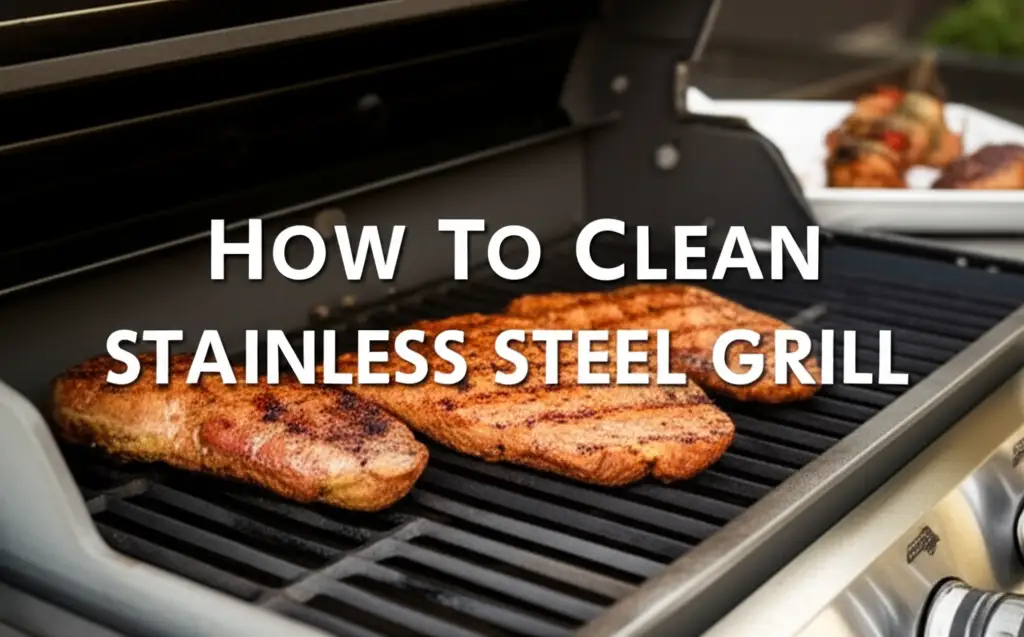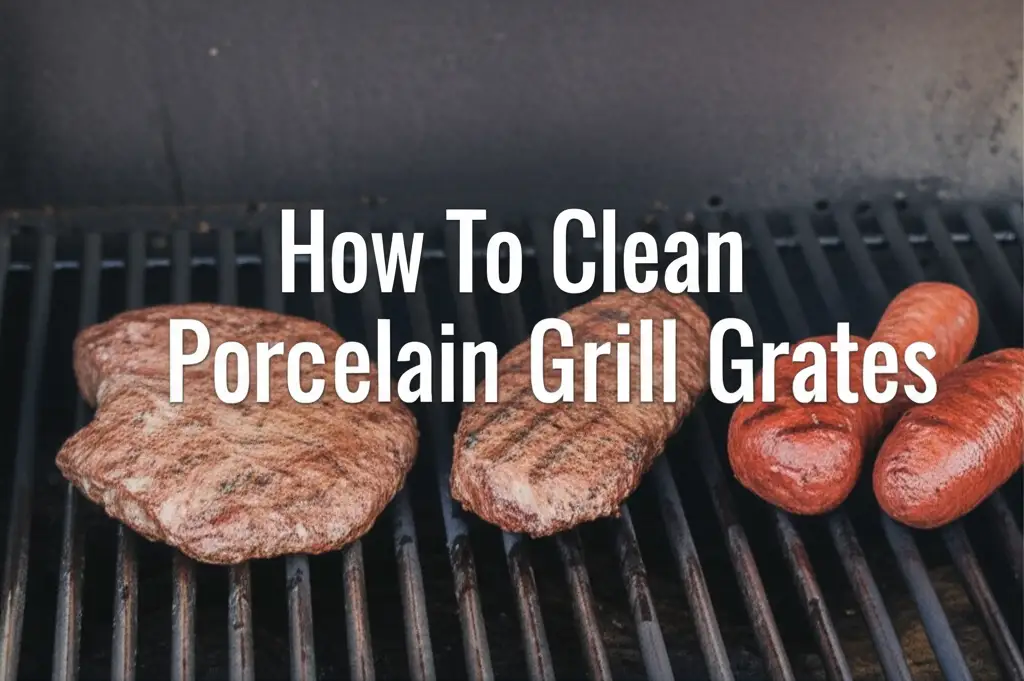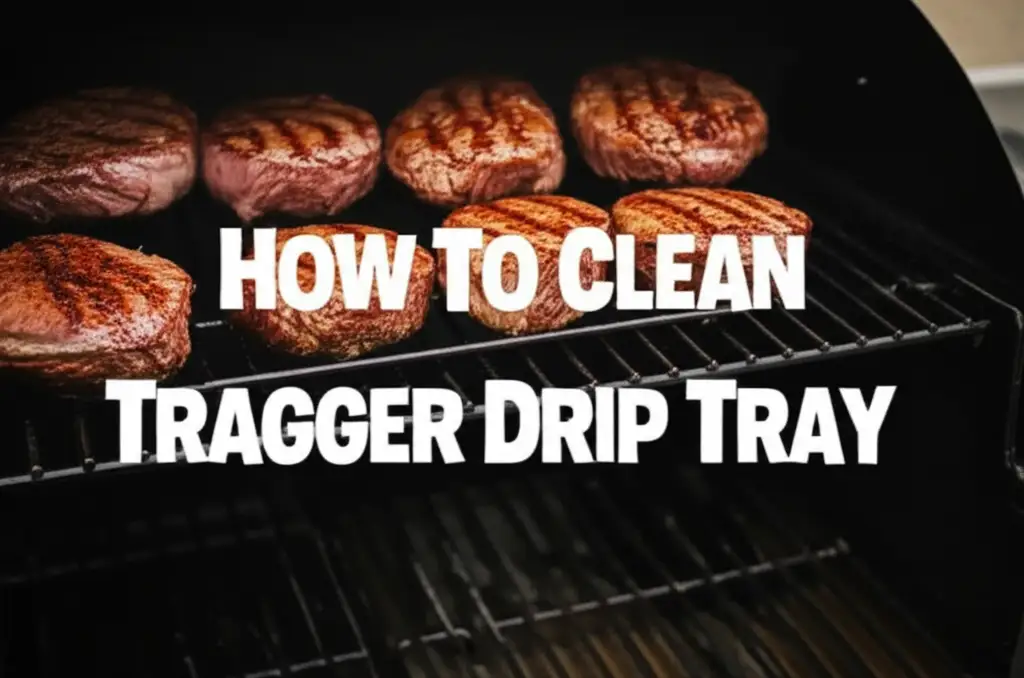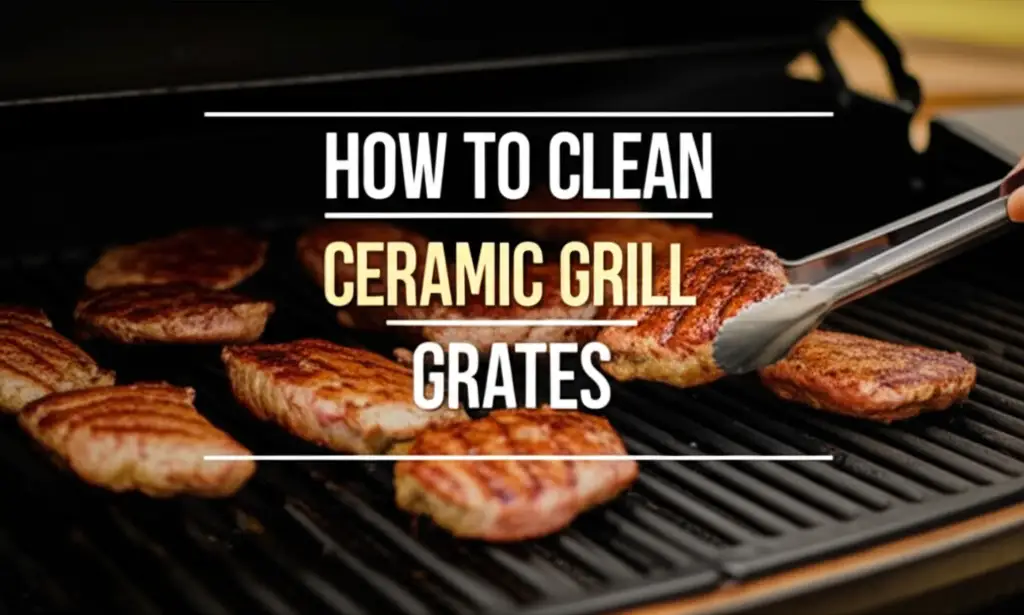· Grill Care · 19 min read
How To Clean Gas Grill Grates

Clean Gas Grill Grates for Better BBQ
Imagine a beautiful summer evening. You fire up your gas grill, ready to cook some juicy burgers or steaks. You lift the lid, and what do you see? Baked-on food residue, grease, and grime covering your grill grates. This sight can ruin your grilling mood. More importantly, dirty grates can affect the taste of your food and even pose health risks.
Learning how to clean gas grill grates properly is essential for any grilling enthusiast. Clean grates ensure your food cooks evenly and tastes amazing. They also extend the life of your grill. This guide will walk you through various methods for cleaning your gas grill grates. We will cover routine cleaning, deep cleaning, and specialized care for different grate materials. Get ready to transform your grilling experience with sparkling clean grates.
Takeaway
- Clean gas grill grates after every use using the hot method for quick results.
- Perform a deep clean using the cold soak method regularly to remove stubborn buildup.
- Adjust cleaning techniques based on grate material, like cast iron or porcelain.
- Use natural solutions like vinegar, baking soda, or onions for an eco-friendly approach.
- Prevent rust and extend grate life by drying and oiling them properly after cleaning.
To clean gas grill grates, first heat the grill to burn off excess food. Then, use a stiff-bristle brush to scrub the hot grates clean. For a deep clean, remove the grates and soak them in warm, soapy water before scrubbing and rinsing thoroughly. Dry them completely to prevent rust.
Why Cleaning Gas Grill Grates Matters for Your Grill
Cleaning your gas grill grates might seem like an extra chore. However, this simple step offers many benefits. It significantly impacts your food’s taste and your grill’s longevity. Neglecting grate cleaning can lead to unpleasant results.
First, clean grates improve food taste. Old food particles and carbon buildup on grates can transfer unwanted flavors to your fresh meal. Imagine grilling a tender chicken breast, only to have it taste faintly of last week’s burnt sausage. This is a common issue with dirty grates. When you clean the grates, you ensure only the fresh ingredients’ flavors come through. This makes every bite pure and enjoyable.
Second, hygiene is a major concern. Leftover food and grease create a breeding ground for bacteria. These contaminants can transfer to your freshly cooked food. This poses a health risk to you and your guests. Regular cleaning removes these harmful residues. It keeps your cooking surface sanitary and safe for preparing meals.
Third, clean grates prevent flare-ups. Grease and food drippings accumulate on dirty grates. When these ignite, they cause sudden, intense flames. These flare-ups can burn your food and even damage your grill components. Cleaning the grates reduces this flammable buildup. This leads to a safer and more controlled grilling experience.
Finally, proper cleaning extends the life of your grill grates. Food acids and moisture can accelerate rust and corrosion. This is especially true for cast iron grates. Regular cleaning and proper drying prevent this deterioration. It ensures your grates remain functional and beautiful for many grilling seasons. I always make sure to clean my grates to protect my investment. You should too.
Essential Tools and Supplies for Grill Grate Cleaning
Having the right tools makes cleaning your gas grill grates much easier. You do not need many specialized items. Most are common household supplies. Knowing what to use and why helps you achieve the best results.
A good grill brush is your primary tool. Traditional wire brushes are popular. However, bristol-free brushes offer a safer alternative. Wire bristles can break off and get into your food. Nylon or coiled metal brushes also work well. I recommend choosing a brush with a long handle. This keeps your hands safe from heat when cleaning hot grates. A scraper attachment on your brush is also very useful for tough spots.
You will also need a bucket or large basin. This is for soaking your grates during a deep clean. Dish soap is essential for cutting through grease. Warm water helps activate the soap and loosen grime. For stubborn buildup, consider white vinegar or baking soda. These natural cleaners are powerful degreasers. They are also safe for food contact surfaces. Many people prefer using these over harsh chemicals.
Protective gear is important. Heat-resistant gloves protect your hands when dealing with hot grates. Regular rubber gloves shield your skin from cleaning solutions and grime. Eye protection is also wise to prevent splashes from getting into your eyes. You want to stay safe while cleaning.
You can also use common household items for cleaning. Aluminum foil, crumpled into a ball, can scrub grates effectively. It works well if you do not have a brush. Learn how to clean grill grates with aluminum foil for an easy method. An onion cut in half can also clean hot grates. You can dip it in water or vinegar and rub it on the grates. This helps remove residue. Some people even use a stiff wire brush to clean grill grates without a traditional brush. Find more tips on how to clean grill without brush if you want to avoid bristles.
Gathering these items before you start saves time and effort. You will be ready to tackle any level of grate grime.
The Hot Method: Cleaning After Each Use
The hot method is the most important cleaning technique for gas grill grates. You should do this after every grilling session. It is quick, effective, and prevents significant buildup. This routine keeps your grates in top condition.
First, let your grill cool down slightly after cooking. It should still be quite warm, but not scorching hot. This allows food particles to loosen. If you wait too long, the grease and food will harden again. You want the grates to be hot enough to make cleaning easy. But they should be cool enough for safe handling.
Next, turn the burners back on high for about 10-15 minutes. This step is crucial. The intense heat will carbonize any remaining food bits and grease. They will turn into brittle ash. This makes them much easier to remove. I always make sure to do this. It works wonders.
After the grates are thoroughly heated, turn off the gas supply. Put on your heat-resistant gloves. Use a good quality grill brush to scrub the grates. Apply firm pressure. Brush in the direction of the grates, not across them. This helps remove all the ash and charred food. Some brushes have scrapers. Use the scraper for any particularly stubborn spots.
Once you have brushed the grates, wipe them down. Use a damp cloth or paper towels. This removes any fine particles left behind. Be careful as the grates can still be warm. You can also lightly oil the grates at this point. Use a paper towel dipped in cooking oil. This helps protect them from rust and prevents food from sticking next time. This hot method is the easiest way to keep your grill ready for action. It saves you from harder deep cleaning later.
The Cold Soak Method: Deep Cleaning Dirty Grates
Sometimes, the hot method is not enough. Baked-on grease and stubborn food can accumulate over time. This calls for a deep clean using the cold soak method. This process takes more time but yields sparkling results.
First, ensure your grill is completely cool. Safety comes first. Then, remove the grill grates from your gas grill. If they are heavily soiled, wear gloves. You do not want to touch greasy, dirty grates with bare hands.
Next, find a large container for soaking. A utility sink, a large bucket, or a plastic storage bin works well. Fill the container with very hot water. Add a generous amount of dish soap. You can also add half a cup of baking soda or white vinegar for extra cleaning power. These natural solutions are excellent degreasers. They help break down tough grime. Place the grates into the soapy water. Make sure they are fully submerged.
Let the grates soak for at least several hours. For extremely dirty grates, an overnight soak is best. The hot soapy water softens the hardened grease and food residue. This makes scrubbing much easier later. I often let mine soak overnight if they are really bad.
After soaking, remove the grates. Use a stiff grill brush or a heavy-duty scrubbing pad. Scrub each grate vigorously. The loosened grime should come off with relative ease. Pay extra attention to the corners and crevices. Rinse the grates thoroughly with clean water. Make sure no soap residue remains.
Finally, dry the grates completely. You can air dry them or use paper towels. To prevent rust, especially on cast iron, apply a thin layer of cooking oil. This protects the surface. Your grates will look almost new and be ready for your next cookout.
Cleaning Different Types of Gas Grill Grates
Gas grills come with different types of grates. Each material requires specific care. Knowing these differences helps you clean them correctly. This prevents damage and extends their lifespan.
Cast Iron Grates
Cast iron grates are known for excellent heat retention. They create beautiful sear marks. However, they are prone to rust if not cared for properly. Never put cast iron grates in the dishwasher. This will strip their seasoning and cause immediate rust.
To clean cast iron grates, follow the hot method after each use. Use a stiff wire brush while the grates are warm. For a deep clean, soak them in warm, soapy water for no more than 30 minutes. Prolonged soaking causes rust. Scrub them thoroughly, then rinse well. The most important step for cast iron is seasoning. After cleaning and drying completely, apply a thin layer of cooking oil. Rub it all over the grates. Then, heat the grill to a high temperature for about an hour. This bakes the oil onto the surface, creating a protective, non-stick layer. This process prevents rust and improves cooking performance. My cast iron grates always look great when I do this. For more detailed instructions, you can refer to how to clean cast iron grill grates.
Porcelain-Coated Grates
Porcelain-coated grates are common because they are easy to clean and resist rust. The porcelain enamel provides a non-stick surface. However, this coating can chip if you use abrasive tools. Avoid wire brushes on porcelain.
Always use a nylon or brass-bristled brush on porcelain-coated grates. These are softer and will not scratch the surface. Clean them when they are warm with the hot method. For deeper cleaning, soak them in hot, soapy water. Avoid harsh chemicals or metal scrapers. If the porcelain chips, the metal underneath can rust. You can read more about caring for these delicate grates by checking out how to clean porcelain grill grates.
Stainless Steel Grates
Stainless steel grates are durable and less prone to rust than cast iron. They are also quite common in gas grills. They can withstand more aggressive cleaning.
You can use a stainless steel wire brush on these grates. Clean them when hot after each use. For deep cleaning, they can handle longer soaks in soapy water. You can even use a degreaser if needed. Always rinse them thoroughly to remove any cleaning solution residue. Stainless steel still benefits from a light oiling after cleaning to prevent sticking and maintain shine.
Enamel Grates
Enamel grates are similar to porcelain-coated ones. They have a glass-like finish applied over steel or cast iron. This makes them relatively easy to clean and resistant to sticking.
Treat enamel grates with the same care as porcelain. Use softer brushes, like nylon or brass, to avoid chipping the coating. Harsh chemicals or metal scrapers can damage the enamel. Clean them warm after each use. For deep cleaning, a simple soak in soapy water works best. Always dry them completely to prevent water spots and potential rust if the enamel is chipped.
Natural Cleaning Solutions for Grill Grates
You do not always need harsh chemicals to clean your gas grill grates. Many common household items make excellent, eco-friendly cleaning solutions. These methods are safe for your family and the environment.
One popular natural cleaner is a mixture of vinegar and baking soda. This combination creates a powerful reaction that breaks down grease and grime. To use this, mix equal parts white vinegar and water in a spray bottle. Spray the solution generously onto cool grill grates. Let it sit for about 15-20 minutes. Then, sprinkle baking soda over the grates. The reaction will create foam. Let it sit for another 15 minutes. After the foam subsides, scrub the grates with a brush. The hardened food and grease will be much easier to remove. Rinse them thoroughly with water.
Lemon and salt can also work wonders. Cut a lemon in half. Dip the cut side into a small pile of coarse salt. Use the lemon half as a scrubber. Rub it vigorously over the warm grates. The acid in the lemon helps dissolve grease. The salt acts as an abrasive. This method leaves a fresh scent too. It is a quick and effective way to clean lightly soiled grates.
Another surprising but effective method involves using an onion. Cut a large onion in half. Skewer it with a fork. While the grill is still warm, rub the cut side of the onion over the grates. The onion’s natural acids and oils help break down cooked-on residue. It also creates steam, which loosens grime. Some people even dip the onion in a bowl of white vinegar before scrubbing for extra power. This is a very old trick that many experienced grill masters use. Learn more about it by exploring how to clean grill with onion.
Steam cleaning is also a natural way to loosen grime. Place an aluminum foil pan filled with water on your grill. Close the lid and heat the grill to high for 15-20 minutes. The steam will soften the baked-on food. Then, you can easily scrape it off with a brush or scraper. This method is great for general maintenance and reducing hard scrubbing.
These natural solutions are gentler on your grates and pose no risk of chemical residue on your food. They prove that effective cleaning does not require harsh substances.
Preventing Rust and Maintaining Grill Grates
Cleaning your gas grill grates is one part of the equation. Preventing rust and maintaining them properly is the other. These steps ensure your grates last longer. They also keep them performing at their best.
Rust is the biggest enemy of most grill grates, especially cast iron. Moisture is the primary cause of rust. Therefore, the first rule of rust prevention is to always dry your grates completely after cleaning. Do not let them air dry outdoors where they can collect moisture. Use paper towels or a clean cloth to wipe them down. For an extra measure, you can place them back on a warm grill for a few minutes. This evaporates any remaining water.
For cast iron grates, regular seasoning is vital. Seasoning creates a protective, non-stick layer. After cleaning and drying, apply a very thin, even coat of high smoke point cooking oil. Vegetable oil, flaxseed oil, or grapeseed oil work well. Use a paper towel to rub it over all surfaces of the grate. Then, place the grates back on the grill. Heat the grill to a high temperature (around 400-450°F or 200-230°C) for 30-60 minutes. Let them cool down slowly. This process bakes the oil into the metal. It forms a hard, protective layer. Repeat this seasoning process every few uses, or whenever the grates look dull.
Store your grill properly. After cleaning and drying, make sure your grill is covered. A good quality grill cover protects it from rain, dew, and dust. This reduces moisture exposure. If you live in a humid climate, consider storing removable grates indoors during the off-season. Keep them in a dry place.
Regular use also helps prevent rust. The heat from grilling burns off any minor moisture. The cooking oils also help to season the grates over time. If you do not use your grill often, make sure to follow the cleaning and oiling steps before storing it.
Even with the best care, sometimes rust can appear. If you spot minor rust, you can often clean it off. A wire brush and some oil usually do the trick. For more extensive rust, you might need a more specific approach. You can get tips on how to clean rusty grill grates if the problem becomes severe. These simple maintenance steps will significantly extend the life and performance of your gas grill grates.
Common Mistakes to Avoid When Cleaning Gas Grill Grates
Cleaning gas grill grates seems simple. However, many people make common mistakes. Avoiding these errors ensures effective cleaning. It also prevents damage to your grates and grill. Knowing what not to do is as important as knowing what to do.
One frequent mistake is using the wrong type of grill brush. Wire brushes are effective, but their bristles can break off. These stray bristles can end up in your food. This is a serious safety hazard. Always check your brush for loose bristles. Consider using bristle-free alternatives. Nylon, coiled stainless steel, or natural bristle brushes are safer choices. You can even use aluminum foil or an onion for cleaning.
Another mistake is neglecting to clean grates regularly. Many people only deep clean once a season. This allows tough, baked-on grime to accumulate. This buildup becomes much harder to remove later. It also impacts your food’s flavor and causes more flare-ups. A quick scrub with the hot method after every use prevents most problems. This routine saves you from hours of arduous deep cleaning.
Not drying grates completely is a major error, especially for cast iron. Water causes rust. Even a small amount of moisture left on the grates can lead to corrosion. Always dry your grates thoroughly with a cloth. Then, put them back on the warm grill for a few minutes to evaporate any remaining moisture. This step is often overlooked but is crucial for grate longevity.
Using overly harsh chemicals is another pitfall. Some strong degreasers can damage certain grate coatings, like porcelain or enamel. Always check the label. Ensure the product is safe for grill grates. Also, make sure it is safe for food contact surfaces. Natural solutions like vinegar, baking soda, or even an onion are often just as effective without the risks.
Finally, putting grates in the dishwasher is a common mistake for some types. Dishwashers use harsh detergents and high heat. This is very damaging to cast iron grates. It strips their seasoning and causes immediate rust. Porcelain-coated grates might also chip or dull. Always hand wash these types of grates. Check your grill’s manual for specific grate material recommendations. Avoiding these common mistakes will keep your grill grates clean, safe, and ready for many delicious meals.
FAQ Section
Can I clean gas grill grates in the dishwasher?
You should not put cast iron or porcelain-coated gas grill grates in the dishwasher. Dishwashers strip cast iron’s seasoning and can chip porcelain. Stainless steel grates might be machine washable, but hand washing is always gentler. Hand washing helps you control the cleaning process and protect the grate material.
How often should I clean my gas grill grates?
You should clean your gas grill grates after every use using the hot method. This removes fresh food residue. Perform a deep clean, like the cold soak method, at least a few times per grilling season. This tackles stubborn buildup and ensures optimal hygiene.
What if my grill grates are really rusty?
For rusty grill grates, first scrub off loose rust with a wire brush. Then, soak them in a mixture of vinegar and water overnight. Scrub again to remove remaining rust. Dry thoroughly and re-season, especially for cast iron. For more detailed steps, refer to how to clean rusty grill grates.
Is it safe to use a wire brush on grill grates?
Wire brushes are effective, but bristles can break off and stick to food. This is a safety concern. If you use a wire brush, always inspect the grates for stray bristles before cooking. Consider using bristle-free alternatives like coiled wire, nylon brushes, or abrasive sponges for safer cleaning.
How do I remove baked-on grease from grill grates?
For baked-on grease, the cold soak method works best. Remove the grates and soak them in hot, soapy water, often with added baking soda or vinegar, for several hours or overnight. The soaking softens the grease. Then, you can easily scrub it off with a stiff brush.
What’s the best way to store grill grates?
Store clean and completely dry grill grates in a protected area. For grates that stay in the grill, use a grill cover to shield them from elements. If you remove grates for off-season storage, keep them in a dry, covered space. Applying a thin coat of oil, especially to cast iron, provides extra protection.
Conclusion
Cleaning your gas grill grates is more than just a chore. It is an essential part of being a responsible grill master. Clean grates ensure your food tastes its best. They also make sure your grilling is safe and hygienic. Moreover, proper cleaning significantly extends the life of your valuable grill investment.
We have explored several effective methods to clean gas grill grates. The hot method is perfect for routine cleaning after each use. The cold soak method handles tough, baked-on grime during deep cleaning. Remember to adjust your cleaning approach based on the grate material. Cast iron, porcelain, and stainless steel all have specific care needs. You also have fantastic natural cleaning options at your disposal, like vinegar, baking soda, and even an onion.
Avoiding common mistakes like using the wrong brush or neglecting proper drying will protect your grates. By consistently following these simple steps, you ensure your grill is always ready for action. You will enjoy perfectly cooked food with pure flavors every time. So, take pride in your grill. Keep those gas grill grates sparkling clean. Your taste buds, your guests, and your grill will thank you. Get out there and grill confidently!
- grill cleaning
- gas grill maintenance
- cleaning grates
- BBQ care
- grill hygiene




